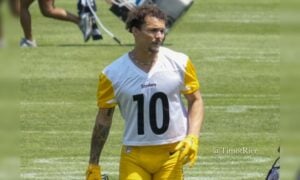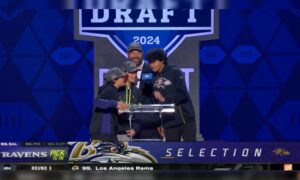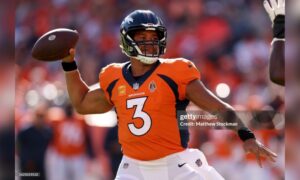Ever since it was revealed that 2014 NFL Draft hopeful Mike Evans signed with a new agency founded by rap moguls—and especially since a photo of the three was released—the topic has arisen as to how this association would affect the wide receiver’s draft status, and whether teams would pass on him as a result.
That agency—Cash Money Sports—was founded by Bryan “Birdman” Williams and Ronald “Slim” Williams, best known for building Cash Money Records, a music label worth tens of millions of dollars and is host to some of the day’s largest hip hop artists.
There seems to be a due amount of concern over the background and history of the Williams brothers, which does include a good deal of unsavory details, both substantiated and unsubstantiated.
At the end of the day, however, it all comes down to talent, and if a team is sold on Evans’ talent, then I suspect that they won’t be overly concerned over who is representing him during negotiations, which are fairly standard for rookie contracts under the new Collective Bargaining Agreement.
To that end, it is important to note that Cash Money Sports is merely working in collaboration with the agency that Evans originally signed with—Priority Sports, a well-established firm that boasts clients such as Haloti Ngata, Arian Foster, and A.J. Hawk, and also deals in other sports as well.
The duo’s sub-label, Young Money Entertainment, had already made inroads last year by investing in an already existing sports agency by the name of Play 2 Win Sports, establishing itself a foundation on which to build.
The partnership with Priority Sports, akin to rapper Jay Z’s Roc Nation Sports’ hiring of a certified contract advisor in order to represent Geno Smith last year, enables Cash Money Sports to get involved in player contract negotiations, as evidenced by the signing of Evans as its first client of any kind.
It’s unclear as to in exactly what capacity the Williams brothers or their immediate employees will even be involved in the process to any degree, but one can assume that they are not entirely ignorant of the process, given their already highly lucrative business ventures in multiples forms of media.
Sports representation is simply the next branch of the Cash Money empire, which also includes Cash Money Content, a publishing house, and may soon also include a film studio.
In truth, it is probably the everyday fan that has far more concerns with Evans’ representative connections than do NFL front offices and scouting departments, including the Pittsburgh Steelers, should they be in a position to draft him. The ultimate evaluation for Evans will come down to his talent.
It should also be mentioned that he excelled throughout the interview process at the Combine, according to multiple reports, and that should far outweigh any issue surrounding his decision to be represented by Cash Money Sports.
And most important of all, Ricky Williams—the first athlete to be represented by a rap mogul back in 1999—thinks it’s a good idea, so there’s that.
That is a jest, of course, but Williams does claim that he was very happy with the contract that he gained despite its role in the downfall of the agency representing him, saying that the peculiar incentive-based nature of the arrangement was his doing. He also said that an agent negotiated on his behalf, not himself nor Master P, the head of the No Limit Sports agency that represented him.
Perhaps the biggest advantage that an agency connected to broader media could give to an athlete comes not through contract negotiations, but rather endorsements and other financial peripherals. But at the end of the day, barring something unforeseen, I expect that this is quite the non-issue, insofar as it influences Evans’ draft stock.







